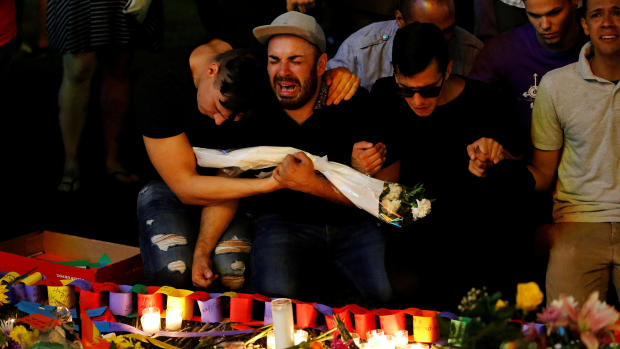Could you be next? Coping with fear after the Orlando shootings
The shooting at an Orlando nightclub this past Sunday that left 49 dead and dozens injured will leave lifelong scars on those directly involved, but it will also take an emotional toll on many who've been watching the tragedy and its fallout from afar.
Even as onlookers are devastated for the victims and their families, Melissa Brymer, program director of Terrorism and Disaster Programs at the UCLA Neuropsychiatric Institute, told CBS News, "An event like this makes us worry about our own safety."
Anxiety, fear and depression are among the feelings many people will experience in the wake of the Orlando attack. And many are now wondering, how safe is their own town and the places they visit with family and friends every day -- movies theaters, dance clubs, cafes, shopping malls.
Dr. Jonathan Comer, associate professor of psychology and director of the Mental Health Interventions and Technology Program at Florida International University's Center for Children and Families, said that's exactly what acts of terrorism aim to do.
Comer, who previously served on the faculty at Boston University and was there at the time of the Boston Marathon bombings in April 2013, said in the aftermath of those events, he and colleagues conducted a lot of research on how families process traumatic events in their community.
"What we learned from that research is that the more people identify with the victims, the more devastating it can be for them, and the more emotional difficulties they can have afterwards," said Comer.
But there are lots of ways to combat that stress and diminish the sense of feeling anxious and victimized.
Comer said, for example, that after the Colorado movie theater shooting in July 2012, parents didn't want to send their kids to the movies.
"But breaking routine can be unstabilizing," he explained. "Families most importantly need to keep their routines. This is not a time to not go out in public."
He recommends focusing on the "probabilities," not the "possibilities," of a similar attack occurring in their towns.
"We try to help patients focus on precise probability, without belittling the actual risks in the world," he said. "There is still more risk of falling and slipping in the shower or getting in a car wreck."
Reaching out to first responders involved in the tragedy, or those in your own hometown, can help kids cope with senseless violence.
"Create cards and artwork -- it's a productive way for children to do some outreach and cope with these events," Comer said.
Donate blood or give to victim funds or advocacy groups that promote tolerance and peace.
UCLA's Brymer said schools and communities can go a long way to helping children and families feel safer by setting in place emergency protocols for what to do in the event of an act of terror or natural disaster.
Some examples: "Seeing security guards present, knowing the different entry and exit procedures for visitors. There could be protocols put into place for kids concerned about bullying. Is there a call-in number if you're worried about the well-being of a student?" Brymer said.
Many communities and university campuses now have enhanced alert systems that send people a text message if a police event is occurring in the neighborhood, to notify them to stay away from that area. There can be social media alert systems set up, too, to keep locals apprised of situations of concern.
Brymer said families should communicate about potential situations as well. "What's your family plan if there's an accident, natural disaster or shooting event? Texting is most effective in times of emergencies because email servers can slow down," she said.
Facebook also has a Safety Check feature where a message can be sent via Facebook to alert all of your friends and let them know you're OK in a crisis.
While it's important to keep informed about what's going on, Dr. Ranna Parekh, director of the Division of Diversity and Health Equity at the American Psychiatric Association, told CBS News people should try to avoid overexposure to news about the tragedy.
"This is especially important for children. The repetition of scenes of violence can be disturbing and confusing. It's important to keep open dialogues with children regarding their fears. Don't minimize the dangers, but create a supportive environment where children know they can ask questions."
There's nothing wrong with feeling fear for your personal safety, Comer said. People shouldn't feel embarrassed or guilty about this response to a mass shooting.
"Fear is natural. Fear is adaptive, too. If we didn't have fear, we'd walk into the street without looking. It's built into us, hard-wired," he said, to keep us safe.
But when fear interferes with functioning, then it's time to reach out for help -- to friends, family members or a mental health expert.
It can take months for people to feel back to normal, and much longer for victims directly affected by terror. Comer said. In the case of Orlando, where a popular gay nightclub was targeted, people who identify as LGBTQ may be especially traumatized -- more so if they've had previous traumatizing experiences or suffer from depression, anxiety, or other mental health conditions.
"Healing is such an individualized experience. Some of it depends on past trauma or losses," said Brymer. "We all have different coping strategies and personalities."
Family and religious support, social and health support, checking in and encouraging -- all are key at times like these, said Brymer.
"Sometimes people just need to talk to someone."
